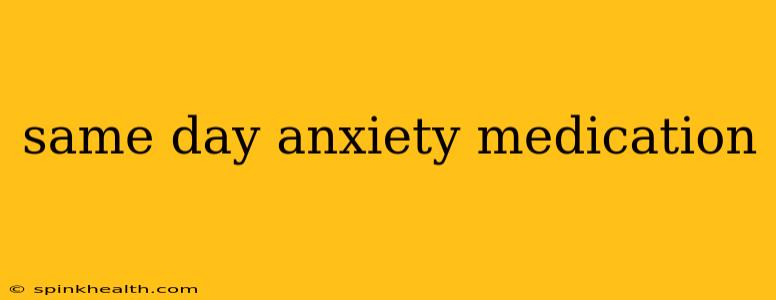Anxiety. That familiar knot in your stomach, the racing heart, the overwhelming sense of dread. For many, it's a sporadic visitor; for others, it's a constant companion. And when that anxiety hits with the force of a hurricane, needing relief today, the search for same-day anxiety medication becomes paramount. This isn't about long-term solutions, but about navigating a crisis, finding immediate solace, and taking the first step towards managing your mental health. This journey is personal and requires a careful, informed approach.
Let's explore the path to finding same-day relief, emphasizing the importance of responsible care and professional guidance. This isn't about self-medicating; it's about understanding your options and making informed decisions with the help of healthcare professionals.
Can I Get Anxiety Medication Today?
This is the question on everyone's mind. The answer, unfortunately, isn't a simple "yes" or "no." The possibility of getting anxiety medication the same day hinges on several factors:
- The Severity of Your Symptoms: Are you experiencing a mild bout of anxiety, or is it a full-blown panic attack? More severe symptoms naturally necessitate quicker intervention.
- Your Existing Relationship with a Healthcare Provider: If you're already under the care of a psychiatrist or therapist, they can provide the most immediate and appropriate care.
- Your Location and Access to Healthcare: Rural areas may have limited access to immediate care compared to urban centers. The availability of walk-in clinics or urgent care facilities also plays a crucial role.
- The Type of Medication: Some medications require a prescription and are not available over the counter. Getting a prescription filled the same day depends on your pharmacy's availability.
What Are My Options for Same-Day Anxiety Relief?
While immediate access to prescription medication isn't always guaranteed, there are options for managing anxiety today:
- Contacting Your Doctor or Therapist: This is the first and most crucial step. They can assess your situation, discuss your symptoms, and determine the best course of action, which may include a prescription or referral to a specialist.
- Visiting an Urgent Care Facility: Urgent care centers can offer immediate assessment and potentially provide temporary medication or refer you to a mental health professional.
- Exploring Non-Medication Options: Techniques like deep breathing exercises, mindfulness meditation, and even a short walk can sometimes offer immediate relief. These methods aren't a substitute for professional help, but they can be valuable tools in the moment.
What Kind of Anxiety Medication Can I Get Same Day?
Again, this depends heavily on your situation and the doctor's assessment. Some medications are more readily available than others. It's critical to understand that you should never attempt to obtain medication without a proper diagnosis and prescription.
It's vital to remember that this information is for educational purposes only and should not be considered medical advice. Always consult a healthcare professional before making any decisions about your treatment.
What Happens If I Can't Get Medication Today?
Don't despair if immediate medication isn't possible. Your mental health is still a priority. Explore alternative coping mechanisms:
- Connect with a support system: Reach out to friends, family, or support groups. Talking about your anxiety can significantly ease the burden.
- Engage in calming activities: Listen to relaxing music, take a warm bath, or read a book.
- Use online resources: Many online resources offer guided meditations, breathing exercises, and other techniques for managing anxiety.
Are There Any Long-Term Solutions for Anxiety?
Managing anxiety often involves a combination of short-term and long-term strategies. This could include:
- Therapy: Cognitive Behavioral Therapy (CBT) and other therapeutic approaches can teach you valuable coping skills.
- Lifestyle changes: Regular exercise, a healthy diet, and sufficient sleep can significantly impact your mental well-being.
- Medication management: Working with a psychiatrist to find the right medication and dosage is crucial for long-term management.
Facing anxiety is challenging, but remember you're not alone. Seeking help is a sign of strength, not weakness. Prioritize your mental health, reach out for support, and explore the options available to find the relief you need. Your well-being matters.

